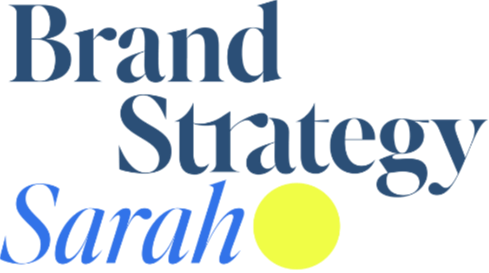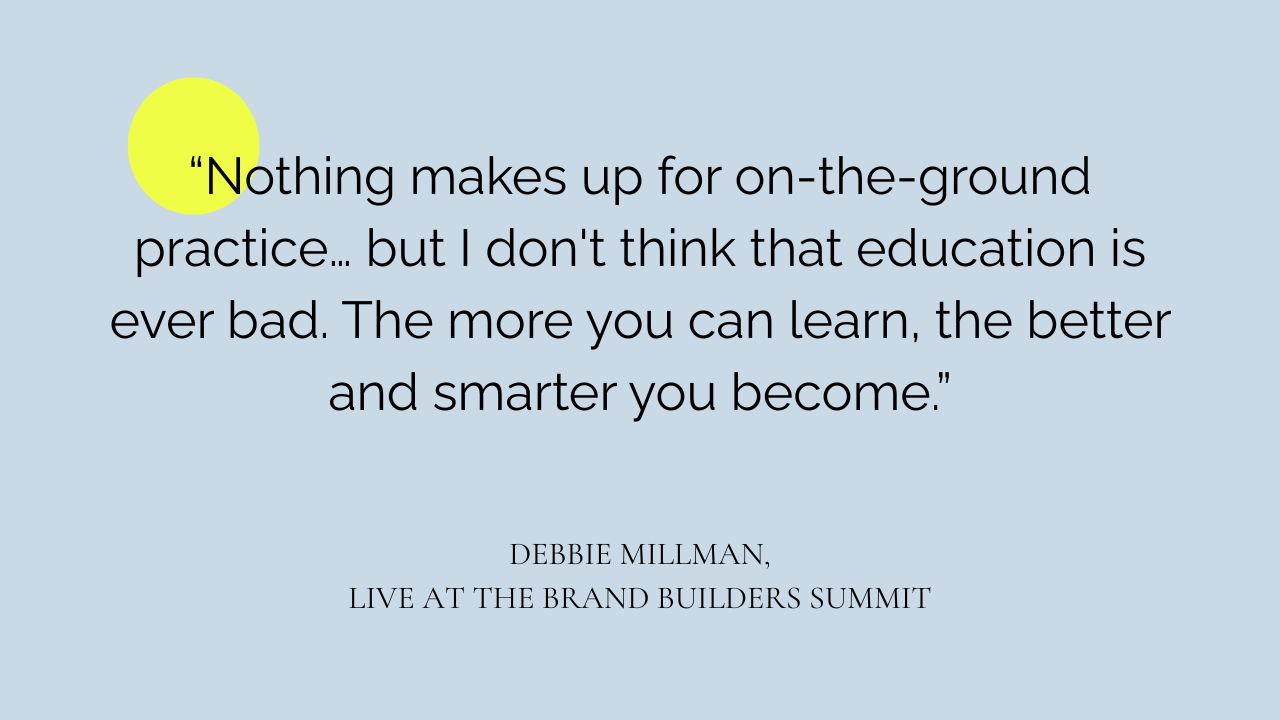Brand Strategy 2025: Key Lessons on AI, Personal Branding and Lifelong Learning from the Brand Builders Summit
Sep 19, 2025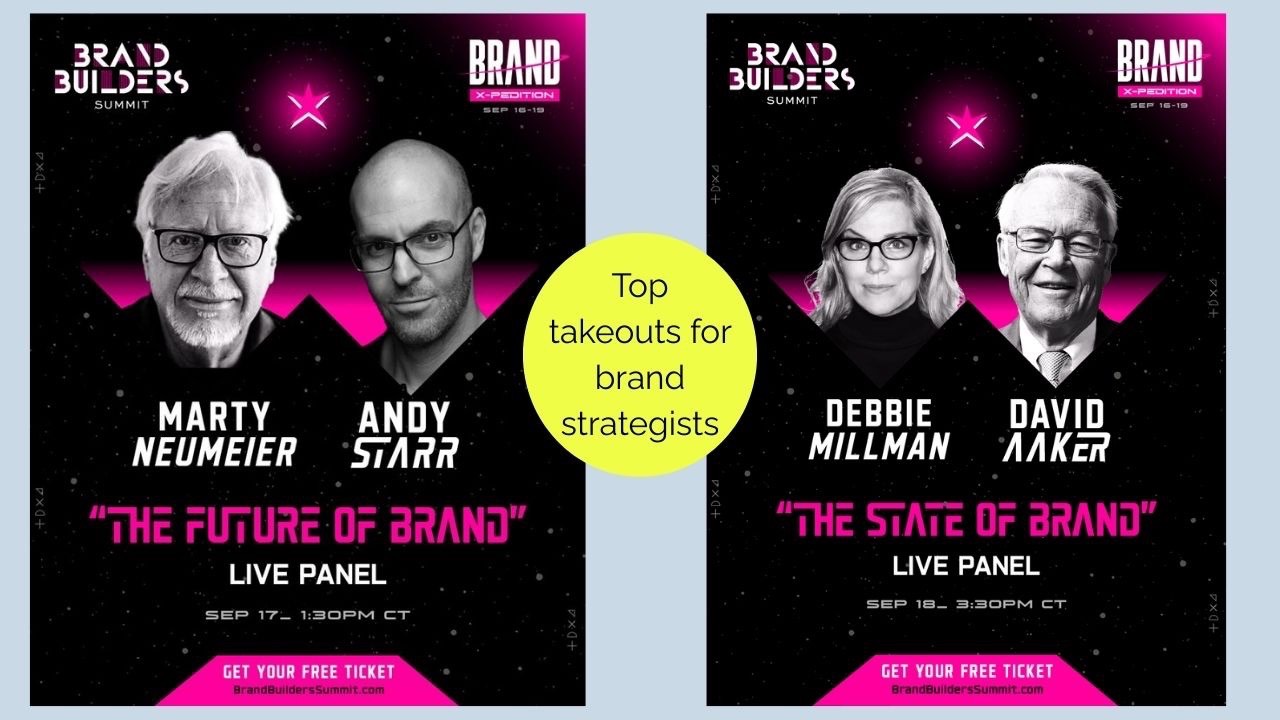
At the Brand Builders Summit two live conversations revealed powerful lessons for all brand strategists. The first was with Marty Neumeier and Andy Starr, then with Debbie Millman and David Aaker.
Here’s where these four thought-leaders strongly agree—and where their perspectives differ—on four crucial themes.
1. Brand strategy builds long-term business value
All four speakers reinforced that brand strategy is not just a tool to guide design and communication, it is the engine of long-term equity and competitive strength.
David Aaker stressed that brands are corporate assets:
“People still think… branding is about awareness and image… [but] branding is not just the communication problem...brand is an asset and you want to build this asset over time… branding touches everything in the organization from product development to customer journey segmentation.”
(If you struggle getting clients to understand this - here's a ton of data to support the value of brand strategy).
Debbie Millman defined it as a process of discovery and alignment that requires everyone in the organisation to be on board.
“I believe that brand strategy is a journey that you take of discovery which results in the work that you need to do to build a brand. And you only have a brand when enough people are in consensus about what that brand means. What that brand means doesn't just grow out of the earth, it's positioning and strategy that develops that foundation. So that's a lot of what I think people sometimes miss about brand strategy. I think a lot of designers think that brand strategy is design strategy and they're very different things."
She warned against imitation:
“If you’re making this thing to compete with something else that’s already out there, there needs to either be a clear differentiating point of view or don’t bother… People aren’t interested anymore in a different form or a different flavor. They’re interested in how is this brand going to make a difference in my life.”
And Andy Starr made a similar point:
"It seems like people want to think a lot less. They're much more inclined to copy someone else's shit, repackage and regurgitate it."
Marty Neumeier reminded us the theory of brand strategy is still sound but the practice and implementation demands craft and creativity:
“There's nothing broken about brand theory. What's broken is execution... And that means really understanding what you're talking about, understanding the connections between all the principles and having the skills to make it work in the real world. And it's probably going to get worse as AI starts to creep into our studios and strategy boards and so forth."
So is AI the answer? Here's what they had to say:
2. How AI will shape the future of brand strategy
David Aaker described how his own firm, Prophet, is already using AI to speed up the strategy process and bring costs down:
“Prophet has really changed dramatically in the last 12 months… when doing competitive research, customer research, trend research, to get a first cut at taglines or brand pillars would take much longer than it takes now. What that means… is that the really sophisticated brand strategy work is now going to be available to more companies than before.”
But he cautioned:
“AI sort of gets you 75% there… the other 25% you have to put in… you're going to need creativity… it's hard to get an emotional feel into it… If you ask AI a question, then you need to ask about eight or ten follow up questions and try to zero it in on something that's going to be more helpful to you.”
He also admitted when Debbie asked him to talk more about the tools that he wasn't really using them - that his role was more writing books and blogs.
Marty Neumeier was more cautious on the topic:
“AI starts to creep into our studios and strategy boards… I think practitioners are taking too many shortcuts. And brand building takes mastery, and mastery takes work. So if you're trying to avoid the work, it's probably going to lead you on the wrong path."
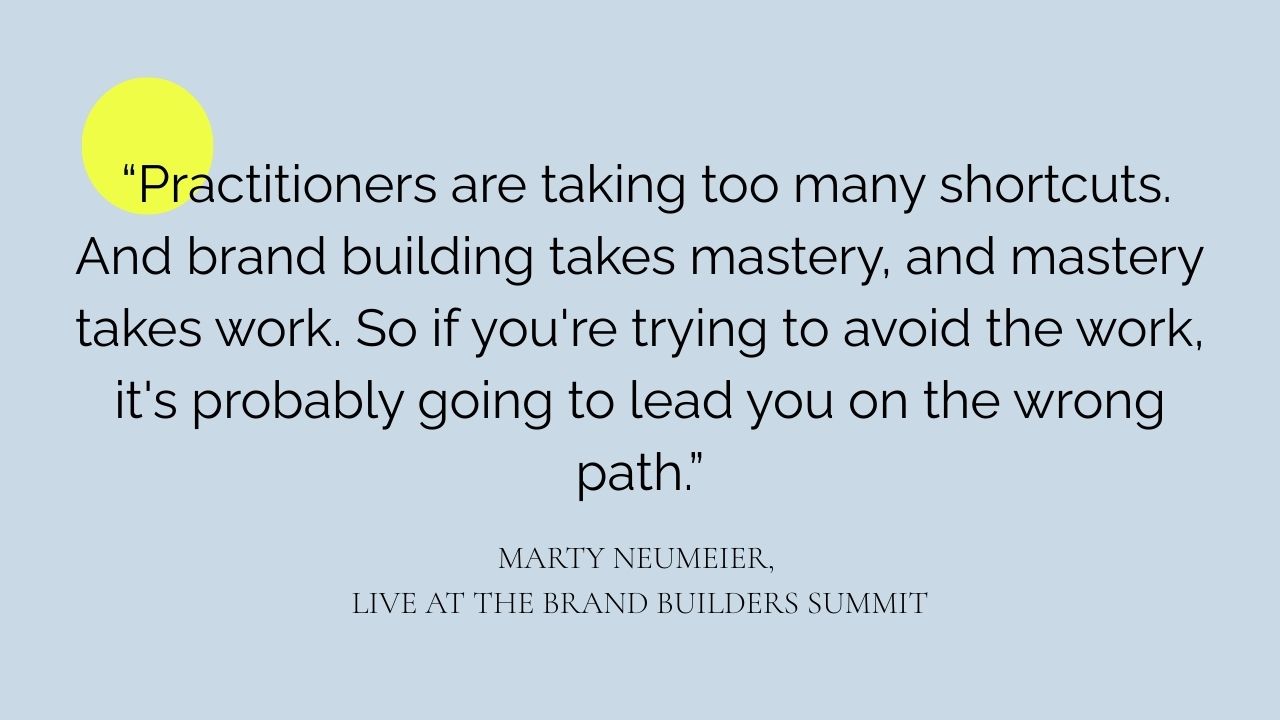
Andy Starr added that:
“There’s kind of like a panic hunt for cheat codes and shortcuts that don’t actually exist.”
They urged brand builders to use AI selectively, guided by taste—
“the ability to recognize and create beauty… not surface prettiness… wholeness, unity.”
Debbie Millman placed today’s fears in historical context:
“The same arguments and fears that I'm hearing about AI are not that different than the fears… in the 80s about the computer… it's not the tool that's going to be good or bad, it's the person using the tool that will direct it.”
Key takeaway:
AI can accelerate research and open high-level brand strategy to many more organisations, but human judgement—creativity, ethics and what Andy and Marty call “taste”—remains irreplaceable.
I believe that you can't take the hard thinking out of it. The tools that exist can be good for some inputs - like understanding trends and competitor brand strategies - but not for generating the answers. They pull heavily on the generic, rational ideas that are already out there but brand strategies need to reflect emotion and differentiation.
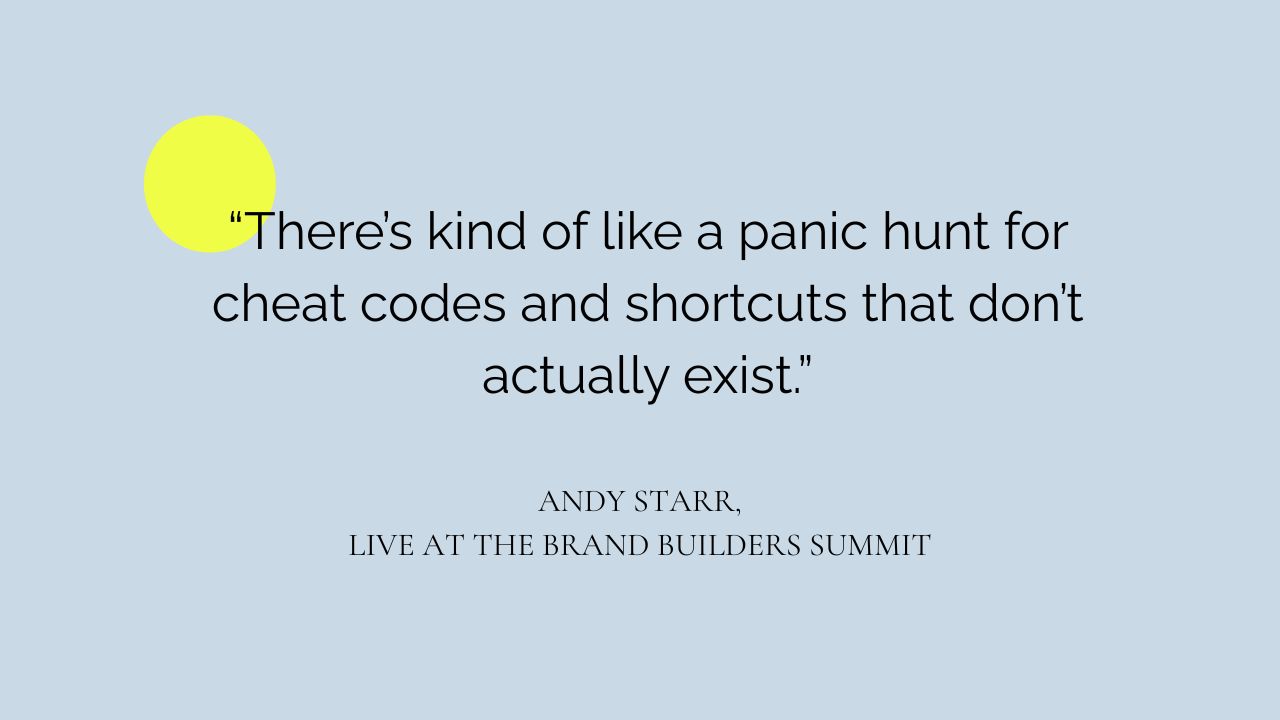
3. Be wary of building your 'personal brand'
I didn't expect the chat to cover this, but both conversations went there naturally and delivered the same cautions.
Marty Neumeier:
“Be very careful about throwing yourself into personal branding, even if you're a solopreneur… branding wasn't designed to be personal… to present yourself as a construct is basically… just dishonest… Instead of thinking about yourself as a personal brand, think of yourself as a person with a reputation… We all know who's fake and who's real, so be careful with it.”
Debbie Millman:
“Brands don't really have souls. And I think this is what people get wrong about personal branding. Anybody that tells me that they're aspiring to be a personal brand, I result because brands are not personal. Brands are impersonal in that brands don't self direct, brands don't breathe, brands don't bleed, brands don't have a real consciousness, any kind of consciousness... Once you put yourself in a position of being a personal brand, I think you end up taking so much away from your ability to have an opinion, to be able to change your mind about things, and to be messy… If I'm not building my personal brand, what should I be working on? Your reputation, your character. That's what people will be able to connect with.”
Authenticity and character build lasting trust; a “manufactured self” cannot. It made me even more committed to put myself out there more on video and share some more of my stories from being a brand strategist for 20+ years.
4. Lifelong learning for brand professionals
Each speaker stressed that continuous learning is the real meta-skill.
Marty Neumeier:
“In fact, all learning is autodidactic. Even if you go to a school… we can't teach you, but we can make it easier for you to learn. You're going to have to take it on yourself… one of the big meta skills… is self-teaching… you never stop learning. There's no deadline for finishing your learning.”
Andy Starr:
“If you feel like you need to take a workshop or a masterclass, take one. But ... take something outside of this space… anthropology, psychology… let fresh air in.”
Debbie Millman:
“Nothing makes up for on-the-ground practice… but I don't think that education is ever bad. The more you can learn, the better and smarter you become.”
David Aaker:
“You definitely can learn by studying strategy. Your experience is going to be very narrow... to get a broader perspective, you almost have to get it through books and school… I think you go to school and you learn from people that are good at it."
Some key takeaways on this topic for me:
- Take ownership of your learning; be an autodidact (self-learner!).
- Combine formal study with hands-on practice.
- Look beyond branding if you're not a beginner. Other disciplines like consumer psychology and anthropology can help you grow as a strategist (I have a masters degree that majored in anthropology but know less about consumer psychology so ordered 3 books that are winding their way to my house as I write!) . If you are a beginner - here's a list of the best books to read and things to listen to to get better at brand strategy.
- Stay curious and never stop learning; mastery is a lifelong journey.
To sum up - these were the four takeaways for me:
- Brand strategy builds enduring business value and the principles and theory of how you do brand strategy aren't changing.
- AI can be a powerful accelerator of some parts of the brand strategy process but it's not a substitute for hard thinking and creativity to get to that all important differentiation and emotional relevance.
- Focus on your reputation and character over your 'personal brand'.
- Lifelong learning is essential: get stuck into something today!
These live conversations from the Brand Builders Summit suggested to me that while tools and trends will evolve, the heart of brand strategy -and professional growth- remains, stubbornly and inspiringly, human.
If you're eager to learn more about brand strategy start right now with my free mini course: Brand Strategy in 7 Simple Steps.
Stay connected with news and updates!
Join our mailing list to receive the latest news and updates from our team.
Don't worry, your information will not be shared.
We hate SPAM. We will never sell your information, for any reason.
